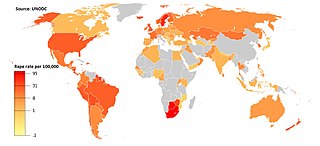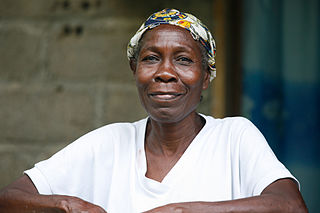Some victims of rape or other sexual violence incidents are male. Historically, rape was thought to be, and defined as, a crime committed solely against females. This belief is still held in some parts of the world, but rape of males is now commonly criminalized and has been subject to more discussion than in the past.
Sex-positive feminism, also known as pro-sex feminism, sex-radical feminism, or sexually liberal feminism, is a feminist movement centering on the idea that sexual freedom is an essential component of women's freedom. They oppose legal or social efforts to control sexual activities between consenting adults, whether they are initiated by the government, other feminists, opponents of feminism, or any other institution. They embrace sexual minority groups, endorsing the value of coalition-building with marginalized groups. Sex-positive feminism is connected with the sex-positive movement. Sex-positive feminism brings together anti-censorship activists, LGBT activists, feminist scholars, producers of pornography and erotica, among others. Sex-positive feminists believe that prostitution can be a positive experience if workers are treated with respect, and agree that sex work should not be criminalized.
Sexual violence is any harmful or unwanted sexual act—or attempt to obtain a sexual act through violence or coercion—or an act directed against a person's sexuality without their consent, by any individual regardless of their relationship to the victim. This includes forced engagement in sexual acts, attempted or completed, and may be physical, psychological, or verbal. It occurs in times of peace and armed conflict situations, is widespread, and is considered to be one of the most traumatic, pervasive, and most common human rights violations.

Bitch was an independent, quarterly alternative magazine published in Portland, Oregon. Its tagline described it as a "feminist response to pop culture", and it was described in 2008 by Columbia Journalism Review as "a respected journal of cultural discourse". As a feminist publication, it took an intersectional approach.
Feminist theory is the extension of feminism into theoretical, fictional, or philosophical discourse. It aims to understand the nature of gender inequality. It examines women's and men's social roles, experiences, interests, chores, and feminist politics in a variety of fields, such as anthropology and sociology, communication, media studies, psychoanalysis, political theory, home economics, literature, education, and philosophy.
Victim blaming occurs when the victim of a crime or any wrongful act is held entirely or partially at fault for the harm that befell them. There is historical and current prejudice against the victims of domestic violence and sex crimes, such as the greater tendency to blame victims of rape than victims of robbery if victims and perpetrators knew each other prior to the commission of the crime. The Gay Panic Defense has also been used to justify violence against LGBTQ people.
Pro-feminism refers to support of the cause of feminism without implying that the supporter is a member of the feminist movement. The term is most often used in reference to men who actively support feminism and its efforts to bring about the political, economic, cultural, personal, and social equality of women with men. A number of pro-feminist men are involved in political activism, most often in the areas of gender equality, women's rights, and ending violence against women.
Diana E. H. Russell was a feminist writer and activist. Born and raised in Cape Town, South Africa, she moved to England in 1957, and then to the United States in 1961. For the past 45 years she was engaged in research on sexual violence against women and girls. She wrote numerous books and articles on rape, including marital rape, femicide, incest, misogynist murders of women, and pornography. For The Secret Trauma, she was co-recipient of the 1986 C. Wright Mills Award. She was also the recipient of the 2001 Humanist Heroine Award from the American Humanist Association. She was also an organizer of the First International Tribunal on Crimes against Women, in Brussels in March 1976.

Rape culture is a setting, as described by some sociological theories, in which rape is pervasive and normalized due to that setting's attitudes about gender and sexuality. Behaviors commonly associated with rape culture include victim blaming, slut-shaming, sexual objectification, trivializing rape, denial of widespread rape, refusing to acknowledge the harm caused by sexual violence, or some combination of these. It has been used to describe and explain behavior within social groups, including prison rape and in conflict areas where war rape is used as psychological warfare. Entire societies have been alleged to be rape cultures.
Date rape is a form of acquaintance rape and dating violence. The two phrases are often used interchangeably, but date rape specifically refers to a rape in which there has been some sort of romantic or potentially sexual relationship between the two parties. Acquaintance rape also includes rapes in which the victim and perpetrator have been in a non-romantic, non-sexual relationship, for example as co-workers or neighbors.

Women in Haiti have equal constitutional rights as men in the economic, political, cultural and social fields, as well as in the family.

Kim Sawchuk is a professor in the Department of Communication Studies, Research Chair in Mobile Media Studies, and Associate Dean of Research and Graduate Studies at Concordia University in Montreal Canada. A feminist media studies scholar, Sawchuk's research spans the fields of art, gender, and culture, examining the intersection of technology into peoples lives and how that changes as one ages.
Rape schedule is a concept in feminist theory used to describe the notion that women are conditioned to place restrictions on and/or make alterations to their daily lifestyles and behaviours as a result of constant fear of sexual assault. These altered behaviours may occur consciously or unconsciously.
Gender, Place & Culture: A Journal of Feminist Geography is a peer-reviewed journal published 12 times a year by Taylor & Francis. It is the leading international journal in feminist geography and it aims to provide "a forum for debate in human geography and related disciplines on theoretically-informed research concerned with gender issues".
The Fembot Collective is an international collective of feminist media activists, artists, producers, and scholars that publishes the academic journal Ada: A Journal of Gender, New Media, and Technology. Fembot has been a catalyst for multiple large scale feminist digital projects, providing the digital and social infrastructure for FemTechNet, publishing the podcast series Books Aren't Dead, and hosting collaborative hack-a-thons and Wikipedia edit-a-thons with Ms. magazine. Although having been funded and supported by multiple institutions including School of Journalism and Communication and the Center for the Study of Women in Society at the University of Oregon., Fembot is concentrated in the University of Maryland currently.
Rape myths are prejudicial, stereotyped, and false beliefs about sexual assaults, rapists, and rape victims. They often serve to excuse sexual aggression, create hostility toward victims, and bias criminal prosecution.
Girl studies, also known as girlhood studies, is an interdisciplinary academic field of study that is focused on girlhood and girls' culture that combines advocacy and the direct perspectives and thoughts of girls themselves. The field emerged in the 1990s after decades of falling under the broader field of women's studies. Scholars within girl studies examine social and cultural elements of girlhood and move away from an adult-centered focus. Those working in the field of girl studies have studied it primarily in relation to other fields that include: sociology, psychology, education, history, literary studies, media studies, and communication studies. Girl studies seeks to work directly with girls themselves in order to analyze their lives and understand the large societal forces at play within them. Scholars in girl studies also explore the connection the field has to women's studies, boyhood studies, and masculinity studies. There are many different definitions of what a girl is. Some may say that a girl is under the age of 18. Catherine Driscoll discusses how in the nineteenth century, girls were traditionally defined as younger than the age of consent. Claudia Mitchell and Jacqueline Reid-Walsh discuss girlhood beginning from birth to late twenties. Girlhood is often designated by age and consists of imitating observed and learned adult behavior.
Women's rights in Jammu and Kashmir is a major issue. Belonging to a patriarchal society, they have had to fight inequality and routine discrimination. Women's rights in Kashmir Valley has major issues as there is harassment of young muslim women participating in sports activities, demands of dowry after marriage, domestic violence incidents, acid attacks on women, and men being generally taken in a higher regard than women. Many small organisations have been formed to struggle for women's rights in Jammu and Kashmir.

Carceral feminism is a critical term for types of feminism that advocate for enhancing and increasing prison sentences that deal with feminist and gender issues. The term criticises the belief that harsher and longer prison sentences will help work towards solving these issues. The phrase "carceral feminism" was coined by Elizabeth Bernstein, a feminist sociologist, in her 2007 article, "The Sexual Politics of the 'New Abolitionism'". Examining the contemporary anti-trafficking movement in the United States, Bernstein introduced the term to describe a type of feminist activism which casts all forms of sexual labor as sex trafficking. She sees this as a retrograde step, suggesting it erodes the rights of women in the sex industry, and takes the focus off other important feminist issues, and expands the neoliberal agenda.
Cybersex trafficking, live streaming sexual abuse, webcam sex tourism/abuse or ICTs -facilitated sexual exploitation is a cybercrime involving sex trafficking and the live streaming of coerced sexual acts and/or rape on webcam.





